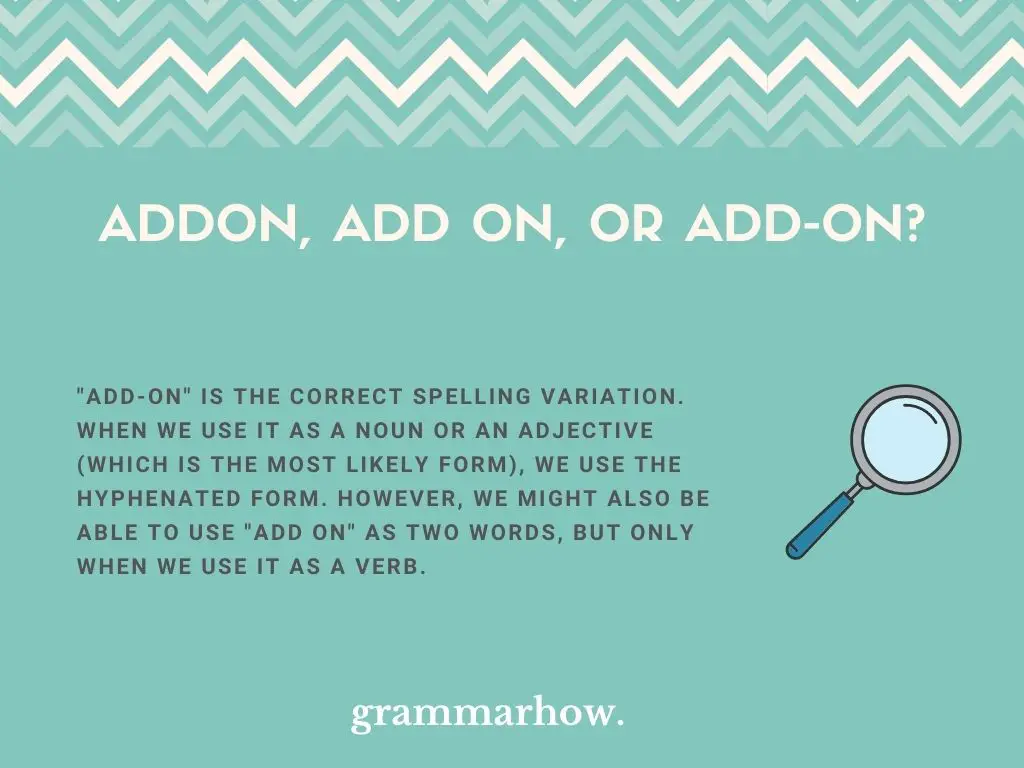“Add-on” is one of those words that seems to come with a few different spelling variations. This article will explore whether it’s one or two words or write it as a hyphenated form.
Add on vs. Add-on vs. Addon
“Add-on” is the correct spelling variation. When we use it as a noun or an adjective (which is the most likely form), we use the hyphenated form. However, we might also be able to use “add on” as two words, but only when we use it as a verb.

According to Google Ngram Viewer, “add-on” is the most popular choice of the three. It’s vastly more popular than the others, which shows you’re more likely to come across it. However, there are also a few uses of “add on,” showing it is also correct.

In The Cambridge Dictionary and The Oxford Dictionary, “add-on” is officially defined as both a noun and an adjective. This shows that it’s the most likely variation for you to come across in English.
Both dictionaries also show that the two-word variation “add on” is correct. It is correct when used as a phrasal verb, which means it shows an action when it is written in a sentence. It comes from the stem verb “add.”
Is “Addon” One Word?
“Addon” is not correct as one word. We must always keep it hyphenated when we want to show that “add” and “on” are modifying a specific noun in the sentence. Since “add” and “on” have different meanings, the hyphen is important to show their intention.
Perhaps some of these examples will help you make more sense of it:
- Correct: I need you to show me how this add-on works before I use it.
- Incorrect: Whatever price you paid for that addon, you definitely overpaid for it.
- Correct: I don’t think you managed to find the correct add-on product for this.
- Incorrect: I’m not sure this addon device is right for what we’ve got.
Is “Add on” Two Words?
“Add on” works as two words when it is a phrasal verb. However, do not get it confused with the hyphenated variation. It is not an adjective, so it cannot modify another noun in the sentence. It is only used to demonstrate an action.
These examples should help you to learn more about the verb form:
- I would like to add on a few more dollars to round this bill up.
- Can we add on a couple of extras before we leave?
- I added on six to the number, but I’m still not sure how I got this answer.
- Why did you add on so much more stuff? I didn’t expect that from you!
Is “Add-on” Hyphenated?
“Add-on” should be hyphenated as both a noun and an adjective. We hyphenate it when it’s an adjective because this is common in English when we modify one word with more than one option. As a noun, we hyphenate it because the two words have different definitions.
According to the AP Stylebook guidelines, hyphenations help us to link more than one word together. When those words modify the same noun (i.e. “add-on content”), we can use the hyphen to show that “add” and “on” mean the same thing.
Without the hyphen, it would imply that “add” modifies “on,” which is why it’s incorrect. That’s why AP Style is so useful to refer to when we’re trying to figure out hyphen rules.
Here are a few examples:
- What have you put in as an add-on for this piece?
- The printer add-on is a lot more impressive than I thought it would be.
- I need you to buy the add-on products as well; otherwise, it won’t be worth it.
- Can you find out more about the add-on content?
Is “On” Capitalized In The Word “Add-On”?
“Add-on” is not a proper noun. It is an adjective, which means there are no specific capitalization rules that we need to worry about. However, it might make sense to capitalize “on” in the hyphenated form when it’s part of a title.
After all, if you capitalize every other word in your title, “Add-on” would look bizarre. If you write “Add-On” instead, it would be more in line with the rest of what you’ve written.

Martin holds a Master’s degree in Finance and International Business. He has six years of experience in professional communication with clients, executives, and colleagues. Furthermore, he has teaching experience from Aarhus University. Martin has been featured as an expert in communication and teaching on Forbes and Shopify. Read more about Martin here.
